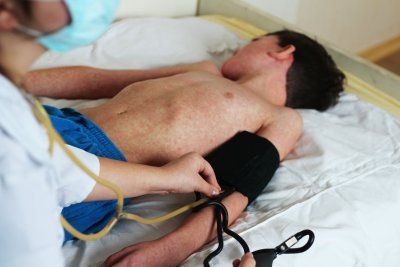According to the European Disease Prevention and Control, there were as many as 17 cases of rubella in Poland in January this year, and 1 case was also registered in Germany. And in February, Germany, Latvia and Poland reported as many as 29 cases of rubella, so a total of 47 cases this year.
There were no confirmed cases of rubella in Lithuania this year. in 2023 two cases of rubella in children were confirmed – both children were of such an age that vaccination was not yet part of the preventive vaccination calendar for children of the Republic of Lithuania.
Darius Varaškevičius, a pediatric intensive care and pediatrics doctor at Kaunas Hospital, says that looking at the surrounding countries, rubella may indeed be detected again in Lithuania.
“As vaccination volumes decrease, there may be more and more such diseases, and various outbreaks may occur. In addition, we must not forget that children and adults come to us from Ukraine, where there are many people with measles,” said D. Varaškevičius.
It is possible to get infected after vaccination, but it is easy to get sick
The question is, why did even a vaccinated child get infected? According to a pediatrician, the rubella vaccine, like many other vaccines, is 100 percent effective. it does not protect against the disease, but it certainly protects against a severe form of the disease, which is the most important thing.
“Of course, cases of infection even after vaccination are rare. The rubella virus is spread by droplets through the air or directly.
What is very bad about rubella is that while there are no symptoms, a sick person can infect others. It is also the case with chicken pox – about 2 days before their appearance, a person already infects others, measles is already contagious 3-4 days before symptoms appear, and rubella is contagious even a whole week before the appearance of rashes and approximately 4 days after the appearance of rashes,” said D Varaškevičius.
Rubella is often confused with measles and can also be confused with scarlet fever, as these diseases have a very similar rash. If at least one of these diseases is suspected, immunological tests are taken, sent to the laboratory, and the sick person should be isolated.
There is no specific treatment for rubella, so vaccination is the only way to protect yourself.
It is important how Poland will deal with the disease
According to the doctor, there is a good chance that rubella will come to Lithuania.
“It is possible that rubella will come to Lithuania as well, everything will depend on how the Polish Public Health Center will deal with the cases and how much they will be able to isolate. If rubella is controlled locally, it will not spread, but the chances are very high. After the war started, when people from Ukraine started to travel, we started to “wait” for measles, but so far we don’t have any major outbreaks,” said D. Varaškevičius.
A pediatrician says that sometimes all it takes is a good spark – if the disease hits the right team with fewer vaccinated people, the outbreak will be bigger.
“The number of vaccinated children is decreasing – our nation really likes to learn from its mistakes, not from others. When a death happens or when close people get sick, only then do we think about it,” the interviewer said.
Rubella poses a great risk for pregnant women, and it is also very dangerous for older people with chronic, oncological diseases.
“The problem is also that people often do not take these diseases seriously and do not admit that they are sick and have come into contact with someone, as in the times of the coronavirus – then the infection started to spread very quickly. Also with rubella and measles, which can start spreading very quickly, because infections are very volatile,” said D. Varaškevičius.
Both measles and rubella are most spread indoors, in the case of children, in kindergartens and schools. An unvaccinated and sick child in kindergarten infects other unvaccinated children, and when they return home, they infect their relatives.
Deaths from measles are already being recorded in Europe
This year, 22 cases of measles have already been confirmed in Lithuania, which is almost 7 times more than last year. As much as 70 percent of all sick people are unvaccinated or their vaccination status is unknown. 40 percent of measles patients were treated in hospitals.
“The only preventive measure that protects every person and the entire society from measles is vaccination, which has been used to vaccinate children in the world for more than 60 years. Unfortunately, in the last few years, not enough children have been vaccinated in Lithuania – the scope of vaccinations is less than 90%. In order to avoid the threat of measles outbreaks not only among children, but also among adults, it is recommended that 95 percent be vaccinated,” – reminds Edita Jegelevičienė, chief specialist of the Infectious Diseases Management Department of the National Public Health Center (NVSC).

The most cases of measles this year were registered in Romania, Austria, France, Italy and Germany. Deaths are also reported – 12 deaths were recorded in Romania, 1 in Ireland.
Symptoms and dangers of rubella
Redhead is an acute viral infection characterized by fever, maculopapular rash, and lymph node reaction, according to the NVSC website. For children, rubella is not a serious disease at all: all clinical symptoms are mild, the disease passes quickly, and complications are extremely rare. Rubella causes the biggest problem for pregnant women: the rubella virus has a strong teratogenic (causing gene or chromosomal mutation, germ development disorders) effect, so a pregnant woman with rubella is at high risk of birth defects.
Rubella virus is an RNA virus belonging to the Togavirus family.
What are the symptoms of rubella? The incubation period for rubella is 15-24 days. Children or adults get it easily: they have a fever for 2-3 days, a rash appears, which lasts from a few hours to 2-3 days. Occipital lymph nodes are often enlarged in rubella, but this is not a reliable diagnostic sign. This disease is very dangerous for pregnant women, as it can cause fetal malformation, the so-called congenital rubella syndrome. The earlier in pregnancy the disease occurs, the more severe the birth defects.
Whooping cough is back
“Delfi” reminds that recently, one of the returning diseases – whooping cough – was talked about by the head of the Children’s Infectious Diseases Department of Santara Clinics Pediatric Center, associate professor Dr. Inga Ivaškevičienė.
When asked what kind of infection it is, Dr. I. Ivaškevičienė answered: “The clinical expression of whooping cough is very different and depends a lot on the age of the affected person. Unvaccinated children usually get that typical, classic whooping cough. At first, there may be non-specific symptoms reminiscent of an acute upper respiratory tract infection, but sooner or later a cough begins – not just a cough, but a paroxysmal one, which can be provoked by anything: positive emotions, laughter, sadness, tears, physical exertion, any kind of excitement: entered some stranger enters the room, ward and can provoke a coughing fit. It is characteristic of whooping cough that children cough for a long time and at the end of the cough they inhale a high-pitched cough – this is the so-called reprise. This is very typical of whooping cough. If you hear a cough like the one I described, there is a very good chance that it could be whooping cough. Of course, it needs to be diagnosed by a specialist.”
The growing number of whooping cough patients is of greater concern to doctors.
“We haven’t seen pertussis in the hospital for many years, or it was only isolated cases, and now it’s only been the first few months of this year, but we’re already seeing more than one case. Of particular concern is a patient with a very severe whooping cough in the Intensive Care Unit. The condition is extremely difficult,” said Dr. I. Ivaškevičienė in mid-April.
Tags: doctor warns forgotten disease Lithuania number sick people neighboring country increasing








